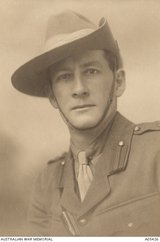confirmed
Born: 29 April 1880
Died: 3 March 1919
The following biography is from the Australian War Memorial.
Oliver Hogue was born in Sydney on 29 April 1880. He had four sisters, including his twin, Amy, and five brothers. Despite being raised in the city, Hogue’s sporting abilities and skill as a horseman led him to consider himself a bushman, and after completing school he travelled thousands of miles by bicycle, camping along Australia’s east coast.
Hogue worked as a commercial traveler before joining the Sydney Morning Herald as a journalist in 1907. When the First World War broke out in 1914 Hogue applied unsuccessfully to become an official war correspondent, and instead enlisted as a trooper with the 6th Light Horse Regiment. He left Sydney aboard HMAT Suevic on 20 December 1914.
Hogue served on Gallipoli for five months before being evacuated to England with enteric fever. He returned to his unit in early 1916, at which point it had pushed out into the Sinai Desert, where allied and Ottoman forces fought for control of the Suez Canal.
Hogue developed a reputation as a loyal and enthusiastic officer unafraid of front-line service. He kept in touch with his family and wrote contributions for the Sydney Morning Herald under the pseudonym “Trooper Bluegum”. His articles were later published as books back in Australia.
Hogue fought in the battle of Romani in August 1916, which finally put an end to the Ottoman army’s threats on the Suez Canal. He served for some time in the Imperial Camel Corps until it was disbanded towards the end of the war, at which point he returned to the light horse and was soon promoted to major. He participated in the Australian advance towards Damascus in Syria. The Ottoman army eventually surrendered in October 1918, and the next year Hogue went on leave to England. After surviving the fighting and harsh conditions in the war, Hogue contracted influenza while in London, and died on 3 March 1919.
Hogue was later described as:
...a man who radiated geniality, and in all his doings was actuated by a kindliness of heart and generosity that won everyone’s regard and affection … Fearless, cool, and brave, he was in many ways a typical soldier. He was a soldier and a gentleman. Unfailing goodness was a quality he possessed in a marked degree.
Sydney Morning Herald, 1919.
- Names recorded
- Service numbers
- Ranks
- Birth records
- Death records
- Life events
- Address
- Relationships
- Organisations
- Main sources
-
- Lieutenant (Lt) (later Major) Oliver Hogue, 2nd Light Horse Brigade, later of the 14th Light Horse Brigade (photograph)
- HOGUE Oliver : Service Number - Major : Place of Birth - Sydney NSW : Place of Enlistment - Sydney NSW : Next of Kin - HOGUE J A (item)
- Discovering Anzacs - Oliver Hogue (webpage)
- First World War Embarkation Rolls - Oliver Hogue (webpage)
- Find War Dead – Hogue, Oliver (webpage)
- Roll of Honour - Oliver Hogue (webpage)
- Honours and Awards - Oliver Hogue (webpage)
- Oliver Hogue outside a dugout on Anzac (photograph)
- Lieutenant Oliver Hogue in his dugout at Anzac. (photograph)
- AWM People Profiles: Major Oliver 'Trooper Bluegum' Hogue (webpage)
- Wartime 44 - They shot the horses - didn't they? (webpage)
- Australian Dictionary of Biography: Hogue, Oliver (1880-1919) (webpage)
- Major Oliver Hogue (webpage)
- Oliver Hogue, Abbassia, Egypt. 1915 (sic). Five members of the 4th Battalion, ANZAC Section, Imperial Camel Corps. (photograph)
- Commemorations
-
- HOGUE O. on the West Face of the Mosman War Memorial
